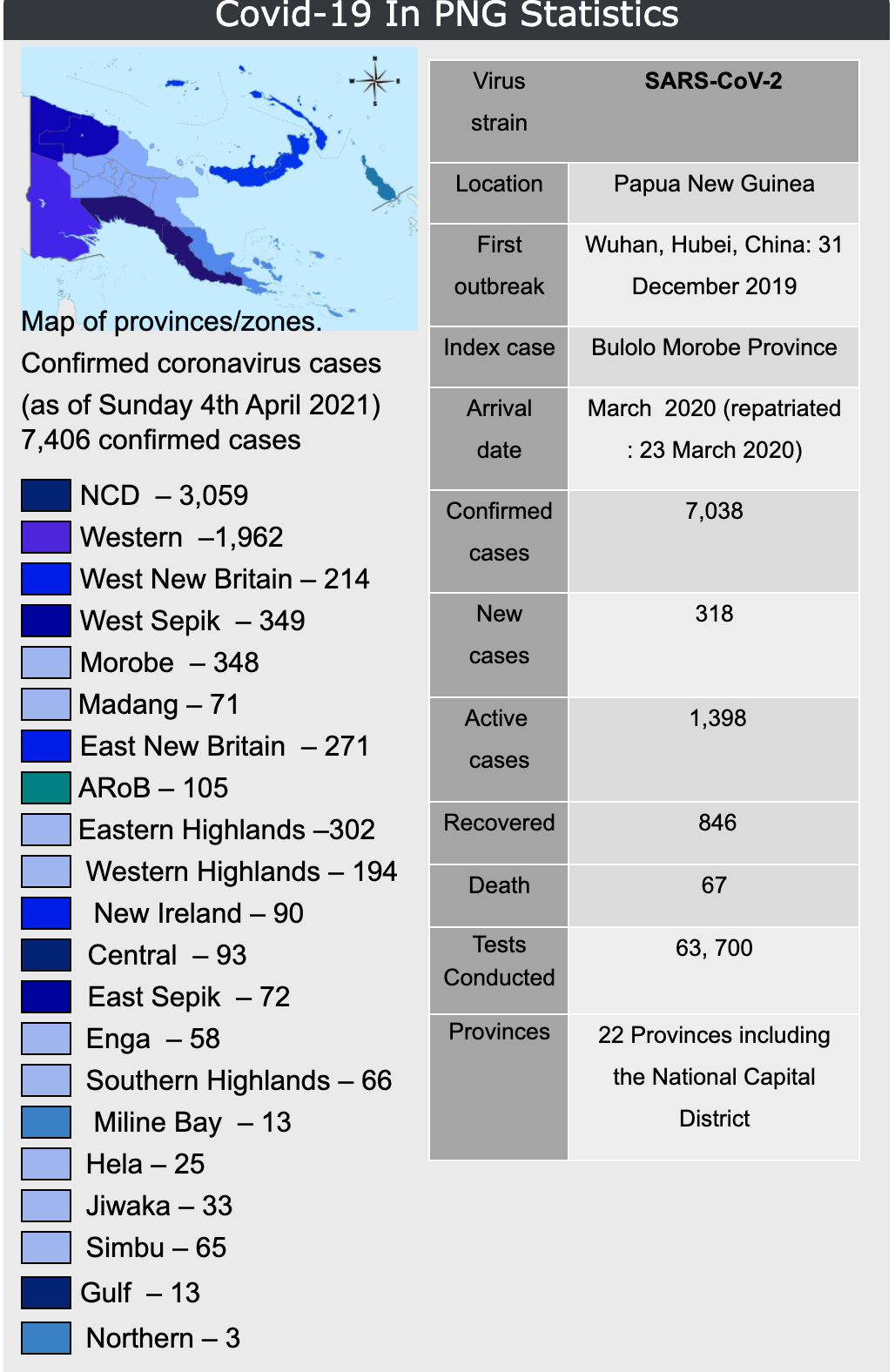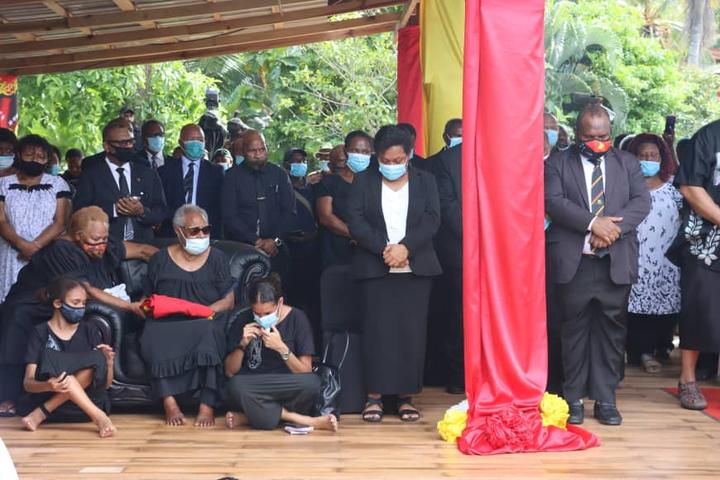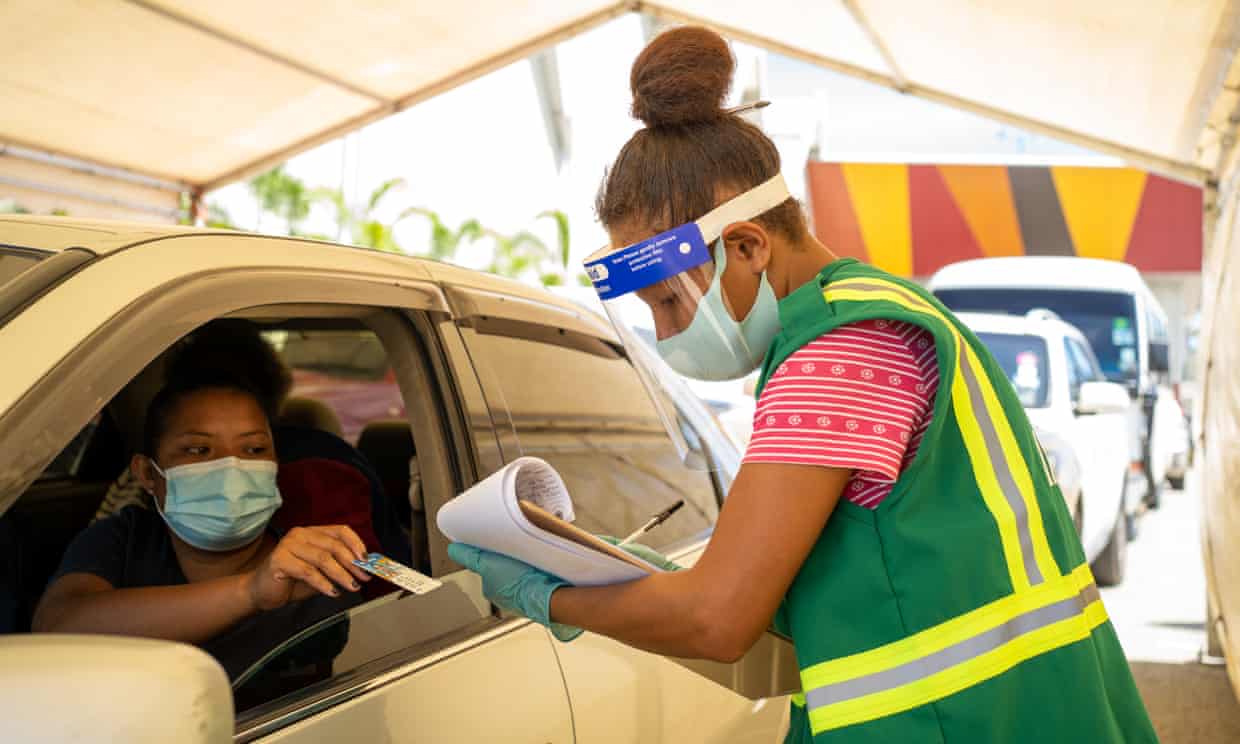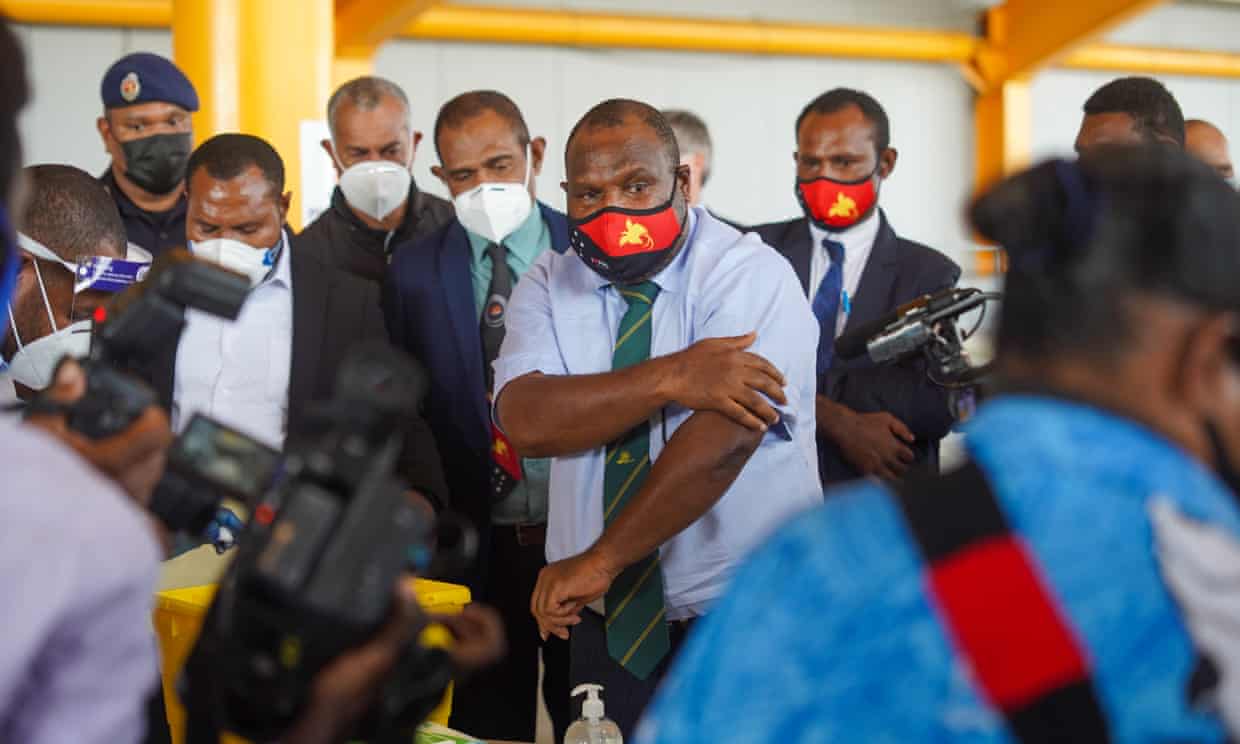*Switch language to french for french version of the article*
As a new lockdown begins in France, many envy Australians and New Zealanders who have been able to enjoy bars, restaurants and even nightclubs for several weeks. However, the situation is far from being the same in the whole Pacific, and is even worrying in places like Papua New Guinea (PNG). This week we take a look at the latest news on this health crisis.
Although the first case of COVID-19 was announced on 20 March 2020 by the Prime Minister, James Marape, the first measures, in particular the closure of the borders to all non-citizens or non-residents, have helped to slow the spread of the virus.1 On 7 April, a 40-year-old woman from New Britain was hospitalised and tested positive to the virus. The following month, a few cases were identified. Most of them were linked to movements between West Papua and PNG which were difficult to control despite the announced closure of borders.2 While the cases detected were now cured, the measures taken remained in place. The government was particularly concerned about new cases coming from West Papua where the situation was not improving.3 During summer, a first peak of contamination appeared and remained stable until February 2021. By the end of February, the country was totalling more than 1,300 cases, including about 450 new cases. February alone represents one third of the cases since the virus arrived in the country.4 And things have not improved, with the number of cases doubling last month (March 2021). The authorities are introducing new regulations. It is now forbidden to travel between provinces and to gather with more than ten people.5 Richard Mendani, Kerema's representative in Parliament, died of COVID-19 on 19 March.6 Since mid-March, the country has been in "national isolation" and Lae, in Morobe province, is in lockdown.7 The situation has been described as out of control by the Prime Minister, James Marape. He was the first to be vaccinated on 30 March, followed by a vaccination campaign focusing primarily on health workers, who were severely affected by the pandemic. Indeed, in March, 150 health workers (out of a total of 250) at the main hospital in Port Moresby tested positive to COVID-19.8 However, these vaccination campaigns do not seem to be enough to stem the spread of the virus. The country's hospitals report that 80% of the tests carried out are positive.9

Covid-19 statistics in PNG (4 April 2021) published on the governmental website. © https://covid19.info.gov.pg/
If the number of more than 7000 confirmed cases (as of 5 April 2021) seems low compared to other countries, it is important to remember several elements. The tests are mainly concentrated around the capital. Together with the country's other major cities, it is the thriving centre for the virus. These densely populated urban centres and their markets particularly make it difficult to control the circulation of the virus.
However, it should not be assumed that the virus is not circulating outside these urban centres, despite what the statistics may lead us to believe. The provinces of Oro and Manus did not report any positive cases in March. Ronny Knight, Member of Parliament for Manus province, points out that this does not mean that COVID-19 is not circulating in the region, but rather reveals the limitations of testing campaigns.10 Not everyone gets tested; since the beginning of the epidemic only about 60,000 tests have been done. In addition, the lack of resources for testing means that the various provinces have to send the tests to Port Moresby, which must then send the results, often several days later. This is true even for the Popondetta hospital, in Oro province, which is rather close to the capital. The total number of cases (around 7000) is therefore likely to be much higher, up to ten times higher, according to some.

Lady Veronica (widow of Michael Somare sitting on the chair on the left), her family and members of the government (James Marape, on the right) for Michael Somare's funerals, Wewak, East Sepik, 15 March 2021 © PNG PM Media via Radio New Zealand
It is also important to understand that the epidemiological peak took place in a very particular context for the country. Numerous ceremonies were organised in memory of the very first Prime Minister and Grand Chief Sir Michael Somare, notably in Port Moresby and in the Sepik, where his funeral on 15 March in Wewak attracted thousands of people.11
Beyond the lack of resources, the country is also facing a significant denial about the disease. Some people refuse to be tested even when they have symptoms. Many theories which spread particularly on social networks such as Facebook or via WhatsApp, claim that Melanesians are immune to COVID-19. Rebecca Kuku, a reporter for The Pacific Project at the Guardian, has collected several accounts of how the virus "won't affect them.”12 The vaccine is seen by some as the mark of the devil, all controlled by the government. The epidemic is seen as a government hoax. In response to these doubts and conspiracy theories, members of the government, including the Prime Minister, decided to be vaccinated first.
While suspicions and conspiracy theories are not unique to Papua New Guinea, the situation is all the more problematic because the country's health system is particularly fragile. And it is this that is causing frustration and anger among medical staff in particular. Glen Mola, head of obstetrics and gynaecology at Port Moresby Hospital reports, "Health workers are risking their lives to continue to provide health services, and many people are just spending their time on screens accusing us of unethical practice, criminal and corrupt misuse of government funds and putting forward false, ridiculous, unfounded conspiracy theories for which there is no evidence."13
Health workers and hospitals are the first to be affected. As a result of budget cuts, coupled with too many sick cases and the lack of medical staff, entire health services and hospitals have closed. The emergency ward at Boram Hospital in East Sepik has been closed. Some wards in Mount Hagen are also closed.14 An emergency hospital has been set up in a sports centre in Port Moresby. The authorities and health staff fear that they will have to turn away patients as is the case elsewhere. The director of the Port Moresby hospital fears the closure of units: “Then we will have people who have car accidents, knife wounds, TB, typhoid, dying in the main car park, or being sent home to their fate.”15 It is indeed difficult to manage such an epidemic for a health system that has only 500 doctors and 4,000 nurses for the whole country. As for respirators, they are all in Port Moresby and there are only six of them.16 As Dr Paki Molumi (director of Port Moresby Hospital) warns, there is also a shortage of space in hospital morgues.17 For Gary Juffa, governor of the Oro province, the pandemic now reveals the “grim reality” of years of neglect and corruption in the national health system.18

Drive-in Covid-19 testing in Port Moresby © Kalolaine Fainu for The Guardian
As a result of this terrible situation, international support has started to arrive. New Zealand is sending a large amount of medical equipment and NZ$6 million in support.19 Australia has sent 800,000 vaccines and has ordered and paid for a further one million doses. Queensland is also launching a campaign to vaccinate across the Torres Strait and may also vaccinate the Western province of Papua New Guinea.20 China has also repeatedly offered to send its vaccines to the country. This offer is still on hold as the Chinese vaccine is not yet licensed by the World Health Organisation.21
The fate of Papua New Guinea depends mainly on the shipment of these vaccines which are becoming the focus of geopolitical negotiations between Australia and China. As researcher Alexandre Dayant explains, "the priority [for Australia] is to prevent the virus from spreading to its territory, but also in the Pacific where Australia remains a privileged partner. If the countries in the region, which have so far managed to contain the epidemic, were to be confronted with an outbreak of cases, this could have consequences for the balance of power in the area by strengthening the position of China which could use vaccines as a diplomatic weapon."22
Enzo Hamel
Cover picture: The Prime Minister, James Marape, one of the first vaccinated person in PNG at the national football stadium in Port Moresby. © Kalolaine Fainu for The Guardian
1 Papua New Guinea Today, 20 mars 2020
2 Radio New Zealand, 23 avril 2020
3 Papua New Guinea Today, 3 mai 2020
4 The National, 4 mars 2021
5 Papua New Guinea Post-Courrier, 19 mars 2021
6 Radio New Zealand, 22 mars 2021
7 Radio New Zealand, 9 mars 2021
8 Belinda Kora, ABC radio, 29 mars 2021
9 SBS News, 3 avril 2021
10 ABC news, 26 mars 2021
11 Ben Doherty, The Guardian, 18 mars 2021
12 Rebecca Kuku, The Guardian, 19 mars 2021
13 ABC News, 25 mars 2021
14 Rebecca Kuku, The Guardian, 5 mars 2021
15 Glen Mola, The Guardian, 16 mars 2021
16 Isabelle Dellerba, Le Monde, 20 mars 2021
17 Belinda Kora, ABC News, 30 mars 2021
18 Rebecca Kuku et Ben Doherty, The Guardian, 9 mars 2021
19 Radio New Zealand, 19 mars 2021
20 Ben Doherty, The Guardian 18 mars 2021
21 Isabelle Dellerba, Le Monde, 20 mars 2021
22 Isabelle Dellerba, Le Monde, 20 mars 2021
- ABC News, 25 mars 2021. « Is a deluge of misinformation driving a surge in coronavirus cases in Papua New Guinea?” https://www.abc.net.au/news/2021-03-26/coronacheck-papua-new-guinea-misinformation-covid-surge/100029154
- ABC news, 26 mars 2021. « I tru sampela PNG provins inogat Covid-19?” https://www.abc.net.au/tok-pisin/2021-03-26/i-tru-sampela-png-provins-inogat-covid-19/13277034
- Belinda Kora pour ABC news, 29 mars 2021. “PNG statim ol vaccine program blong em wantaim ol helt wokas” https://www.abc.net.au/tok-pisin/2021-03-29/png-covid-update/13280630
- Belinda Kora pour ABC News, 30 mars 2021. “Inogat moa spes long bikpla hausik long Port Moresby” https://www.abc.net.au/tok-pisin/2021-03-30/pom-gen-crisis/13282452
- Rebecca Kuku pour the Guardian, 5 mars 2021. “Papua New Guinea hospitals run out of funding as Covid cases surge” https://www.theguardian.com/world/2021/mar/05/papua-new-guinea-hospitals-run-out-of-funding-as-covid-cases-surge
- Rebecca Kuku et Ben Doherty pour The Guardian, 9 mars 2021. “Papua New Guinea forced to wait for vaccines as coronavirus crisis spirals out of control” https://www.theguardian.com/world/2021/mar/10/papua-new-guinea-forced-to-wait-for-vaccines-as-coronavirus-crisis-spirals-out-of-control
- Glen Mola pour The Guardian, 16 mars 2021. “Covid has reached my hospital in Papua New Guinea – people could soon be dying in the parking lot” https://www.theguardian.com/world/2021/mar/17/covid-has-reached-my-hospital-in-papua-new-guinea-people-could-soon-be-dying-in-the-parking-lot
- Ben Doherty pour The Guardian, 18 mars 2021. “Papua New Guinea to impose ‘harsh control measures’ as Covid outbreak spirals” https://www.theguardian.com/world/2021/mar/18/papua-new-guinea-to-impose-month-long-restrictions-as-covid-outbreak-spirals
- The Guardian, 19 mars 2021. “’This is what we feared’: how a country that avoided the worst of Covid finally got hit” https://www.theguardian.com/world/2021/mar/20/this-is-what-we-feared-how-a-country-that-avoided-the-worst-of-covid-finally-got-hit-papua-new-guinea
- Isabelle Delerba pour Le Monde, 20 mars 2021. “Le Covid-19 déferle sur la Papouasie-Nouvelle-Guinée, jusqu’ici assez épargnée” https://www.lemonde.fr/planete/article/2021/03/20/le-covid-19-deferle-sur-la-papouasie-nouvelle-guinee_6073879_3244.html
- The National, 4 mars 2021. « Covid-19 claims 3 lives » https://www.thenational.com.pg/covid-19-claims-3-lives/
- Papua New Guinea Post-Courrier, 19 mars 2021. “New Measures to Take Effect” https://postcourier.com.pg/new-measures-to-take-effect/
- Papua New Guinea Today, 20 mars 2020. “PNG Confirms first Case of Coronavirus-COVID -19” https://news.pngfacts.com/2020/03/png-confirms-first-case-of-coronavirus.html
- Papua New Guinea Today, 3 mai 2020. “PNG COVID-19 update in May” https://news.pngfacts.com/2020/05/png-covid-19-update-in-may.html
- Radio New Zealand, 23 avril 2020. « PNG registers 8th confirmed covid-19 case” https://www.rnz.co.nz/international/pacific-news/414935/png-registers-8th-confirmed-covid-19-case
- Radio New Zealand, 22 mars 2021. “PNG MP Mendani dies of Covid-19” https://www.rnz.co.nz/international/pacific-news/438858/png-mp-mendani-dies-of-covid-19
- Radio New Zealand, 9 mars 2021. “Lae locked down and PNG hospital restricts services as Covid cases rise” https://www.rnz.co.nz/international/pacific-news/437958/lae-locked-down-and-png-hospital-restricts-services-as-covid-cases-rise
- Radio New Zealand, 19 mars 2021. “NZ sends PPE to PNG for Covid crisis” https://www.rnz.co.nz/international/pacific-news/438739/nz-sends-ppe-to-png-for-covid-crisis
- SBS News, 3 avril 2021. “’Enormous concern’ as Papua New Guinea reports another 144 coronavirus cases” https://www.sbs.com.au/news/enormous-concern-as-papua-new-guinea-reports-another-144-coronavirus-cases
